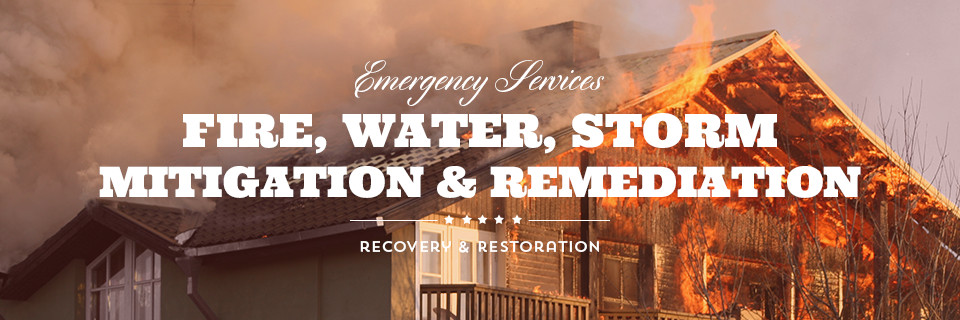Fire Damage
Fire and smoke damage permeate everything they touch, your flooring, walls, ceilings, and all your belongings. Smoke damage can also contain toxic chemicals potentially causing severe health problems and even death. While you may not be able to see all the damage from a fire, it can find its way through all the systems in your house, plumbing, ventilation, and heating and air. All the way through damaging expensive equipment and leaving odors that can be extremely difficult to get remove.
Dealing with a Fire
When you undergo a fire disaster you have to deal with more than just what got burned up in the fire. In a lot of cases, the smoke caused by the fire and the water used by firefighters to put the fire out, will cause much more damage than the fire itself.
Because of the unique circumstances caused by fire damage, you need a company with the ability to take on many challenges, including:
- Ability to assess, selectively remove damaged debris and contents and haul it off.
- Pack out and haul off all necessary contents for offsite storage, cleaning, soot removal, and deodorization.
- Contain the damaged area and dry out the structure, including any contents that were wetted from putting out the fire.
- Neutralize the smoke smell and deodorize the structure and all of it's components.
- Knowledge, ability, and licenses required to perform the complete rebuild and put everything back to the way it was before the disaster.
After a Fire
Recovering from a fire can be a physically and mentally draining process. When fire strikes, lives are suddenly turned around. Often, the hardest part is knowing where to begin and who to contact.
The following checklist serves as a quick reference and guide for you to follow after a fire strikes.
- Contact your local disaster relief service, such as The Red Cross, if you need temporary housing, food and medicines.
- If you are insured, contact your insurance company for detailed instructions on protecting the property, conducting inventory and contacting fire damage restoration companies. If you are not insured, try contacting private organizations for aid and assistance.
- Check with the fire department to make sure your residence is safe to enter. Be watchful of any structural damage caused by the fire.
- The fire department should see that utilities are either safe to use or are disconnected before they leave the site. DO NOT attempt to reconnect utilities yourself.
- Conduct an inventory of damaged property and items. Do not throw away any damaged goods until after an inventory is made.
- Try to locate valuable documents and records. Refer to information on contacts and the replacement process inside this brochure.
- If you leave your home, contact the local police department to let them know the site will be unoccupied.
- Begin saving receipts for any money you spend related to fire loss. The receipts may be needed later by the insurance company and for verifying losses claimed on income tax.
- Notify your mortgage company of the fire.
- Check with an accountant or the Internal Revenue Service about special benefits for people recovering from fire loss.
For more information on what you should do after a home fire, including valuing your property, replacing documents, and salvage hints, visit the U.S. Fire Administration's website.
Reference: http://www.ready.gov/home-fires
